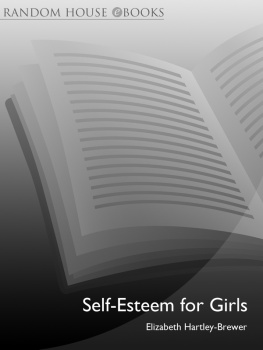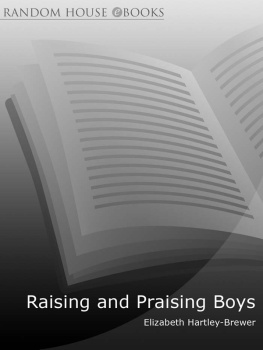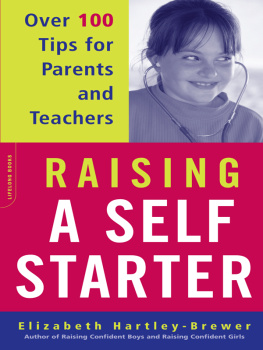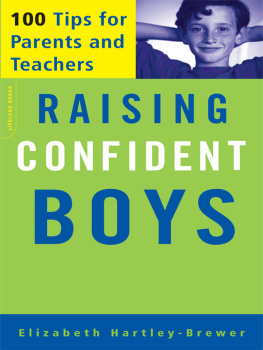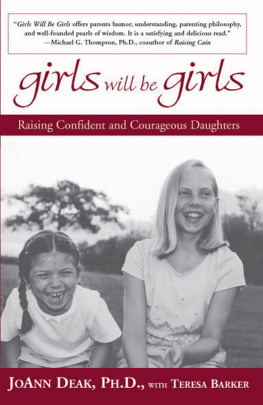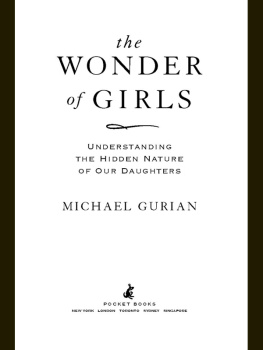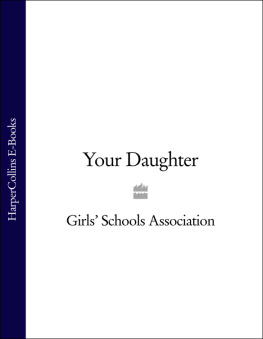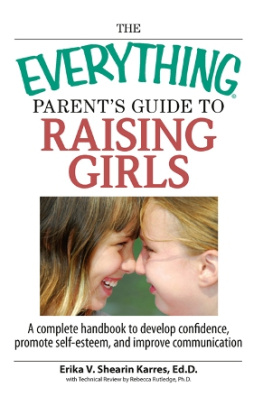for Raising Happy and
Confident Children
Elizabeth Hartley-Brewer

VERMILION
LONDON
This ebook is copyright material and must not be copied, reproduced, transferred, distributed, leased, licensed or publicly performed or used in any way except as specifically permitted in writing by the publishers, as allowed under the terms and conditions under which it was purchased or as strictly permitted by applicable copyright law. Any unauthorised distribution or use of this text may be a direct infringement of the authors and publishers rights and those responsible may be liable in law accordingly.
Version 1.0
Epub ISBN 9781409004479
www.randomhouse.co.uk
11 13 15 17 19 18 16 14 12 10
First published in the United Kingdom in 2000 by Vermilion
an imprint of Ebury
Press Random House 20 Vauxhall Bridge Road London SW1V 2SA
Text copyright 2000 by Elizabeth Hartley-Brewer
The right of Elizabeth Hartley-Brewer to be identified as the author of this work has been asserted by her in accordance with the Copyright, Designs and Patents Act, 1988.
All rights reserved. No part of this publication may be reproduced, stored in a retrieval system, or transmitted in any form or by any means, electronic, mechanical, photocopying, recording or otherwise, without the prior permission of the copyright owner.
The Random House Limited Reg. No.954009
Addresses for companies within the Random House Group can be found at www.randomhouse.co.uk/offices.htm
A CIP catalogue record for this book is available from the British Library
ISBN 9780091855864
Designed by Lovelock & Co.
Contents
DEDICATION
For Georgia and her life-long friends Miranda, Avani, Lizzie and Jessica,
with whom she has shared so much for so long
Acknowledgments
The idea for this book and its partner, Self-esteem for Boys, came from my editor, Jacqueline Burns. Had she not been such fun to work with, I may not have gone ahead with it. So Id like to thank her, and Amy Corzine, who took over the reins for Jacquelines maternity leave.
I am indebted to two teacher friends in particular, Dexter Hutt, Principal of Ninestiles School, and Gary Wilson, Head of English at Newsome High, who both gave precious time to long conversations and script reading, which I needed and really appreciate. I should also like to thank Geoff Evans, of the Cmon Everybody project; Adrienne Katz, of the research organisation Young Voice, which published The Can-Do Girls; Jo Adams, for her report GirlPower; and Alex Vear, a good, wise friend and mother of two daughters in the thick of growing up, for helping in various ways.
Finally, Id like to thank my daughter, Georgia, who is just entering adolescence, for her constant support, love and understanding. I wish her well for the adventure ahead.

CHAPTER 1
Understanding Her Challenges
and Opportunities
Everything seems to be going right for girls. Their confidence, exam results, and career opportunities are rising. Released from the prison of home and hearth, they have a freedom that was unheard of 50 years ago. Many boys feel that girls have it easy and resent it, for the have-it-all world that beckoned their mothers seems a go-and-get-it-all world to their daughters, and leaves boys behind.
Competent, successful superwomen have bred competent, successful supergirls or have they? Not very far under the surface of girl power lie new pressures and insecurities that come with our daughters enhanced potential for success. Some, such as eating disorders, have arrived in the slipstream of that success; others exist where success is absent, for success has certainly not come to all girls, who today manage a triple dose of expectation: to be academically and economically successful; to be emotionally independent; and to achieve the heightened standard of beauty that cosmetics, clothes and even surgery can now provide. They are expected to look good for themselves and their female friends, not necessarily for the opposite sex, who are regarded as bringing more problems than they are worth, hence the new female goal of emotional as well as economic independence. Alongside this emotional aloofness is an equally pervasive pressure for girls to be not only sexually aware but also sexually skilful. The magazines tell them how. It is an emotional minefield in which many vulnerable girls get blown up, as teenage pregnancy figures testify.
There are academic casualties, too. While many girls are working the new educational system to their advantage, some succeed only at considerable cost to their mental health and well-being. Others fail to make it at all. Two to three girls in every 100 will attempt suicide some time in their teenage years. Indeed, females between 15 and 19 are the highest single risk group for attempted suicide.
Some parents add to the pressures their daughters feel. Like them, they fall prey to the look-good, feel-good, get-rich-quick society. Mothers can look more stunning than their ugly duckling daughters for years, and must be very self-assured not to play this game.
The brighter side of the story is that at the beginning of the twenty-first century, females have more opportunities, and are less restricted by their gender than ever before. There are few areas of sport, leisure or work that remain the exclusive preserve of males, in theory at least. They can have all this and also become mothers.
With so much available to girls, parents and teachers have the task of helping them make the most of their abilities. However, to maximise their chances and to protect themselves against the potential problems of their new position in society, girls need plenty of positive self-esteem and large doses of genuine self-assurance.
Girls must fashion a new femininity one that will encourage integrity, respect for others and themselves, independence and autonomy while acknowledging their biological inclination to nurture. Femininity used to imply making oneself look pretty for men, being self-effacing, submissive, compliant and placid, always thinking of and caring for someone elses needs before addressing ones own. This is now rejected by most young women but, in pushing themselves forward, some have simply aped men.
A respectful regard for themselves as being female is vital if they are to remain psychologically intact in the face of the abuse that so many suffer, and also for their female gender. They should not consider themselves weak or inferior to boys because they may be more emotional or dont always feel in control. Girls must acknowledge their own needs while recognising other peoples, see themselves as having worthwhile views, and accept that they deserve care and respect from others.
The amount of self-criticism, low self-esteem and dissatisfaction with their looks and performance that exist unexpressed behind even confident exteriors should be a matter of considerable concern. Girls thrive when people notice when theyve done something well, listen to and take them seriously, and acknowledge their rights.
If girls are to become more self-assured, parents and other involved adults cannot start too soon. Building self-knowledge, identity, confidence and self-esteem the constituents of inner strength is the way to create a resilient young woman who is able to cope with challenges and an uncertain future with confidence.

